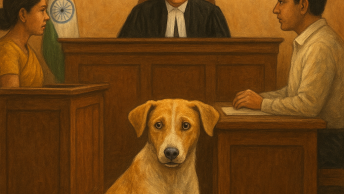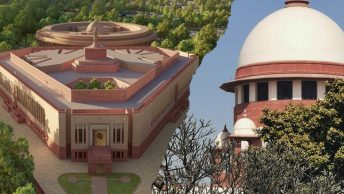Shivraj Singh Chouhan, the Chief Minister of Madhya Pradesh took oath on March 23, 2020. Almost a month until then, the governance was being carried out by the Chief Minister alone without the benefit of the Council of Ministers [‘Council’]. However, only on April 21 was the Council expanded to six including the Chief Minister. This inexplicable delay in forming the Council is undesirable for the governance, lest it be in a pandemic. Therefore, it is necessary to understand if this form of governance is constitutionally permissible.
Council of Ministers – An Indispensable Tool
Article 163(1) of the Constitution says that there shall be a Council with the Chief Minister at its head. This Council can only come into existence once the Chief Minister makes recommendations to the Governor under Article 164(1) to appoint the Council. However, no timelines are fixed for this process. This however, is no free ride. Absent codified law, the Supreme Court has held that constitutional conventions govern these situations. Such conventions are established if, first, there is consistent precedent; second, the actors involved in creating those precedents believed that they were bound by a rule and; third, whether there is a reason for such a rule.
In our situation, the ‘rule’ is to administer an oath to the Council simultaneously with the Chief Minister. Ivor Jennings in his book states that the ‘reason behind such rules’ are found in the “implied principles of the Constitution.” Here, the reason for the rule is the principle of cabinet form of government in a parliamentary democracy. There the Chief Minister is only a first among equals and the decision-making process is deliberative and not despotic. Thus, governance proceeds on the principles of a responsible, accountable and democratic government. As a result, the presence of multiple ministers ensures that governance is efficient where multiple issues require inter-ministerial co-ordination. Not only that, it also endures a system of checks and balances where no one minister can dictate or override decisions where another has a significant stake. Therefore, the presence of the cabinet as a collective lends itself not only to better governance but also, the idea against centralizing power in an individual.
This idea finds reflection in the approach adopted by Article 163(1) and Article 164(1). Only at the stage of formation of the Council under Article 164(1) is the discretion of the Chief Minister, an individual, at play. Once the Council has been formed, the Chief Minister as an individual gives way to the collective conscience of the Cabinet in matters of day to day governance. Therefore, a principle of one-man council inverts this constitutional scheme and ethos. It converts governance by a collective into governance by an individual. Unsurprisingly, only four instances exist of a one-man or an extremely small group of minsters as a Council i.e. Karnataka in 2019 and, the current one in Madhya Pradesh in 2020 as single person cabinets. Telangana had a two-person cabinet in 2019. The only other instance I came across was a three-person cabinet in Orissa in 1959. Without additional information available, these instances seem like aberrations in the convention. Therefore, the constitutional convention must be that the Council must be sworn in simultaneously with the Chief Minister.
Minimum Size of the Council
However, it may be difficult to swear in the full Council at once. Taking care of this problem was the 91st Constitutional Amendment in 2003 inserting Article 164(1A). It fixed the minimum size at 12 members. Therefore, the burden of swearing in the full council is taken away while ensuring that the governance is not centralized in the hands of a few. The Chief Minister has to only recommend the minimum number at the outset and the expansion of the Council can happen later.
It has been argued that the minimum size is not a mandatory requirement. This is done by relying on a rather cryptic two-line order of the Supreme Court in 2008 interpreting Article 164(1A) which challenged a Council of 18 ministers when, after the amendment, only 17 ministers could be permitted. The Supreme Court said, “However, this is a case where Article 164(1A) cannot be strictly implemented in view of the peculiar circumstances of the case. We leave open the question to be decided in other appropriate case.” The present circumstances are of a minimum requirement and not the maximum ceiling on the Council. Either way, the Court made it clear that this order is limited to the facts of that case and it cannot act as precedent. In any event, the scheme of the Constitution and the conventions make it clear that the Constitution despises a one-man government or even a small group which makes governance opaque and centralized.
The only exception sought to be made by the 91st Amendment relates to states with smaller houses. The Statement of Objects and Reasons of the Amendment says in cases of smaller states the twelve members are not necessary but, the minimum was proposed to be seven. Interestingly, this does not find mention in the text of the Amendment. Therefore, the only situation where the requirement of 12 members may be relaxed are such states.
Madhya Pradesh being one of the largest states, cannot avail that relaxation. Therefore, even with a cabinet expansion which took place on April 21, the size of the Council remains unconstitutional. It fails to adhere to the constitutional balance which was struck by the 91st Amendment. The inevitable consequence all actions of the Council and those predicated on the Council’s advice are amenable to judicial review.
As we saw such one person governments are not an isolated instance but a trend in the last couple of years. Cautioning against this, Ivor Jennings said, “A person who proposed to substitute himself for the Cabinet—to make, that is, a change which could be brought about without any alteration of law, would be regarded as a dangerous revolutionary.” Our constitutional structures should work against the risk of such dangers. Therefore, choice of a one-person government must remain alien to our parliamentary democracy.
I am grateful to Prof. Agnidipto Tarafder, Rishabh Mohnot, Mahima Cholera and the Editors of the blog for their suggestions.






